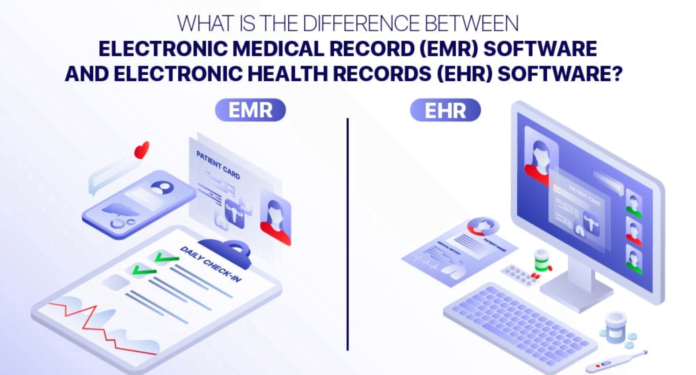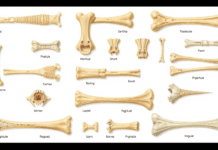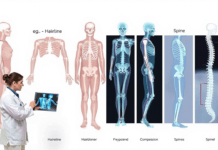Do you have any idea about EMR (Electronic Medical Record)? Or do you know anything about EHR (Electronic Health Record)? If not, then read this guide to explore the details about both topics and also learn the Difference between EMR and EHR. In the early days, the healthcare industry had more paperwork and manual tasks to maintain the medical and health records of the patients.
After the technology development, transition of paper to digital record maintenance by doctor’s offices, hospitals, nursing facilities and clinics have begun. Many health organizations and the federal government started investing huge amounts to fund the software, hardware & necessary training to adapt to this changeover.
While talking about digital recordkeeping, then software like Electronic Medical Record and Electronic Health Record plays the major role. There are many news coverage and stories about this system everywhere during the switch to electronic records. Even though both these terms look similar, there are some differences that you must know. Go through further to explore the difference between Electronic Medical Record and Electronic Health Record.
What is an Electronic Medical Record?
EMR is the digital or computerized version of the patient’s physical chart at the medical practice. Usually, it consists of the complete patient’s medical history, treatments & diagnoses by the doctor, healthcare specialist, nurse practitioner, surgeon, clinic or dentist.
After the introduction of Electronic Medical Record, traditional paper based medical records have been replaced. It lets healthcare organizations and providers collect & manage the overall patient data effectively and let them improve patient care to the next level.
There is different information you can find in those records, such as:
- Personal details such as name, contact address, age & insurance details
- Clinical notes and records from doctors
- Medical history like surgeries, illness, family history and vaccination records
- Prescribed medication records
- Treatment plans
- Test & report results
What is an Electronic Health Record?
EHR is also the digital or computerized version of the patient’s physical chart, but it describes medical history in detail. Electronic health records can be easily shared with other facilities or providers. Therefore, authorized users can instantly access the EHR of the patient across different facilities or providers.
Electronic Health Records give increased access for healthcare providers to explore patient information. It gives a clear view of the patient’s history and health status. Through that, healthcare experts can make better decisions to diagnose, provide treatment & care plans.
Difference between EMR & EHR:
EMR is the clear view of the patient’s medical history, whereas the EHR is the overall detailed report of the patient’s health. Take a look at below to explore the difference between them.
| EMR (Electronic Medical Record) | EHR (Electronic Health Record) |
| Digital or computerized version of the patient’s paper-based, basic information & medical records. | Detailed digital or computerized view of the patient’s overall health history. |
| Less transferability around the healthcare facilities | More transferability around the healthcare facilities |
| Patient medical history is known only to the single medical practice. | Patient medical history can move to other medical practices when patients move. |
| Best for diagnosis & treatment plans. | Best to make better decisions. |
Advantages & disadvantages of EMR & EHR:
Both EMR & EHR consist of both advantages & disadvantages. Check out below to explore everything.
EMR advantages:
- Track data much better with increased record management.
- Optimized workflow with automated reminders, electronic prescribing and digitized scheduling.
- No risk of damaged patient data documents or medical errors.
EMR disadvantages:
- Restriction in data sharing among other healthcare providers or different institutions.
- Privacy & cybersecurity concerns.
- Less patient health history.
EHR advantages:
- No restriction in data sharing among other healthcare providers or different institutions.
- Complete patient’s medical history including allergies, lab results to radiology images.
- Make better decisions like clinical guidelines & alerts.
EHR disadvantages:
- Costly & complex technical integration & implementation processes.
- Technical problems due to the technical infrastructure that may impact data accessibility & complete patient care.
- User experience of the software is poor and tests the patience of healthcare experts.
From the above, now you have explored both EMR & EHR consists of both advantages & disadvantages. Now it is completely up to the healthcare facilities to choose the suitable one for their overall process and services.
Do clinics use EMR or HER?
Most clinics prefer to use electronic health records over electronic medical records due to many reasons. There is some difference between both the software from the ability to data exchange and comprehensive patient data. It can result in better understanding of patients & their requirements. It leads to enhanced patient care.
Electronic medical records are still used in clinics, hospitals and clinician offices, but electronic health records can provide a clear detailed history of patients to them and also easily transferable among different facilities.
Common benefits of both EMR & HER in healthcare:
Take a look at below and explore the common benefits of both EMR & HER in healthcare:
- Healthcare can be improved and medical errors can be reduced with accurate, updated and fast information.
- Patient physicals are very clear and complete. Therefore, there is no need to decode anything.
- Sharing patient info can reduce duplicate medical testing and also save providers and patient’s money, trouble and time.
- Better access to the patient information to prescribe medication reliably and safer.
- Letting patients know about their health condition thoroughly and take preventative care.
- Accurate diagnosis and treatment for patients through the overall information.
At present, both these electronic records are making healthcare less costly and more efficient. Hence it will be a great investment for the nation’s healthcare.
Conclusion:
From the above mentioned scenario, you have explored the Difference between EMR and EHR. You also have explored how this software helps both patients and healthcare providers. You can also experience about healcard Hospital Management Software and Clinic Management Software and click for schedule a demo for Management Software.





